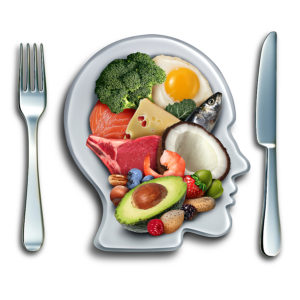 Diets? So much information, so little time. And so much misinformation! What stands out above all the other eating regimes is the KetoFLEX 12/3 protocol for brain health. When it comes to your brain, don’t be misled by dieting hype on the Internet.
Diets? So much information, so little time. And so much misinformation! What stands out above all the other eating regimes is the KetoFLEX 12/3 protocol for brain health. When it comes to your brain, don’t be misled by dieting hype on the Internet.
Along with exercise, diet is key to preserving brain health and longevity as we age. If you want the best diet for a healthy brain, then choose a ketogenic eating plan.
I wrote last week about how the KetoFLEX 12/3 diet came about as part of a comprehensive treatment plan for people with Alzheimer’s Disease and other cognitive problems. It’s important to outline the details of the KetoFLEX plan, because it differs a lot from most other diets. It’s not just what you eat (and don’t eat) but also about when and how often you consume food.
KetoFLEX 12/3 Tips for a Healthy Brain
Dr. Dale Bredesden, a leading Alzheimer’s expert, recommends the KetoFLEX diet for his dementia patients. From his book The End of Alzheimer’s Program: The First Protocol to Enhance Cognition and Reverse Decline at Any Age, here are ten helpful dietary rules that will help you maximize neuroprotection:
- Eliminate sugar, simple carbs (processed food), grains, and dairy, which are inflammatory.
- Vegetables, with a glycemic index lower than 35, should comprise the bulk of your diet.
- Include a combination of deeply pigmented leafy greens and cruciferous vegetables.
- Don’t forget herbs, spices, and teas, which are often packed with even more antioxidants than vegetables.
- Include healthy fats such as those from avocados, nuts, seeds, and extra virgin olive oil.
- Avoid the “Berfooda Triangle,” which is a dangerous triad of food: simple carbohydrates, saturated fats, and a lack of fiber; think cheeseburger, fries, and a soft drink. The lack of fiber leads to higher absorption of carbohydrates, which triggers inflammation and raises insulin levels.
- Don’t forget gut health! Include prebiotic fiber, resistant starch, and probiotic foods.
- If you choose to include animal protein, prioritize low mercury wild-caught seafood and pastured eggs for brain-healthy DHA and choline.
- Animal protein should be a condiment or side dish. One gram of protein per kilogram of lean body mass per day is adequate for healthy people. Those over age 65 and those who are underweight, working to optimize GI health or healing from an underlying infection or surgery may have higher requirements until they can heal.
- Eat heirloom fruit seasonally, such as wild crab-apples in the fall. Berries, cherries, grapefruit, lemons, and limes can be enjoyed year-round. Always balance nutritive value against glycemic concerns.
What to Eat to Beat Cognitive Decline
From Dr. Bredesen’s website, Apollo Health, here are guidelines for what to eat and what to avoid eating.
- Cruciferous vegetables, such as broccoli, cauliflower, cabbage, Brussels sprouts, and alliums such as garlic and onions.
- Leafy green vegetables, such as kale, spinach, arugula, collard greens, and lettuces.
- Herbs, spices, and teas, especially green and matcha.
- Avocados, olive oil, nuts, and seeds.
- Wild-caught fish, especially SMASH fish (salmon, mackerel [not king or Spanish], anchovies, sardines, and herring), which are naturally low in mercury.
- Pastured eggs
- Prebiotic foods such as mushrooms, jicama, and leeks
- Resistant starches such as legumes, rutabagas, parsnips, and green bananas
- Probiotic foods with live active cultures such as sauerkraut, kimchi, sour pickles, miso soup, and kombucha low in sugar
- Wild berries, tart cherries, grapefruit, lemons, and limes
Avoid these Foods for a Healthy Brain
- Sugar and other simple carbohydrates, including bread, crackers, pasta, rice, cookies, cakes, candy, sodas (diet and regular)
- Processed or refined foods
- Grains
- Dairy (Occasional A2 dairy may be considered)
- High-mercury fish such as tuna, shark, and swordfish
- CAFO meat and poultry (Grass-fed meat and pastured poultry may be considered)
- Deer, elk, and moose due to chronic wasting disease
- Fruits with high glycemic indices, such as pineapple
- Fruit juice
When you shop for groceries, keep these tips in mind. Even if you don’t have dementia, a diet for a healthy brain will protect you from the diseases of aging.

Recent Comments